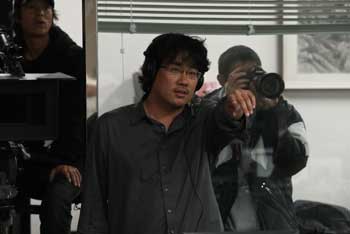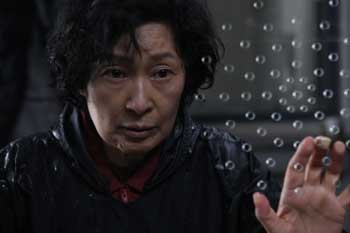 Back to selection
Back to selection
BONG JOON-HO, “MOTHER”
Mother, the latest film by South Korean director Bong Joon-Ho, is an inky affair. The humor is dark and the sky is a soggy shade of gray. The bumbling characters have limited prospects, and when love exists, it’s intense and deranged enough to kill for.
The central relationship in the film is between Yoon Do-Joon, a slow-witted young man, and his unnamed mother. The son is played by Wan Bin, a wide-eyed Korean heartthrob cast effectively against type; his good looks leave us continually disappointed by his character’s slow intellect. His protector, oppressor and champion—also known as his mom—is played by Kim Hye-ja, an actress so well-known in Korea for her roles in onscreen families that she has nearly come to embody the concept of motherhood itself.
In Bong’s film, Kim Hye-ja wears chin-length, frizzy hair and boxy, out-moded jackets. She is a wan-faced widow who simpers and wheedles to protect her covert acupuncture gig from sanction by the police. But when her son is accused of murdering a local high school girl, she sets her jaw in determination and crusades for his vindication once and for all. Kim’s character veers from the histrionics of doomed mythological mothers (check out Agave in Greek mythology) to the dogged gumshoe played by Frances McDormand in Fargo (1996). Yet Kim’s “mother” remains somehow understated. She is so intent on her investigation that it’s almost hard to keep her in focus at all; it’s a constant temptation not to become a partner in obsession. But don’t question her actions, whatever they might be. She’s just a regular mom after all.
Magnolia Pictures opens the film this weekend.

Filmmaker: What brought you to filmmaking?
Bong Joon-ho: There wasn’t one moment of epiphany, but by the time I was 15 years old, I knew for sure that I wanted to become a filmmaker. I’ve liked drawing and comics since I was a child. Even now, when I make a film, I usually start out by drawing. I make a sort of storyboard and draw it all myself. My love of draftsmanship made aligning images and drawing out the visual aspects of a story familiar territory when it came to cinema.
Filmmaker: How did the film Mother emerge?
Bong: The film revolves around the main character, the mother played by Hje-Ja Kim. She was the starting point for the film, and an actress already well known to Korean audiences as the stereotypical warm-hearted mother. But for some reason, I sensed a psychotic side of her. Once I’d noticed that about her, it was what I wanted to make the film about: exploring the psychological or psychotic aspects of her personality. In Korea, taking a new approach to this actress, Hje-Ja Kim, who is so widely portrayed as a typical, kind, gentle mother, would also be taking a new approach to the definition of mother.
Filmmaker: How did you work with Hje-Ja Kim to develop her performance?
Bong: She is an actress who has been acting even before I was born. As a kid, I would see her whenever I turned on the TV. When I met her for the first time and knew that I’d be working with her, I thought, “She is a veteran and knows everything. She’s been in the industry for longer than I have. What am I going to say to her?” But when we actually began to work together, she was very humble. Her attitude was, “Treat me if as I’m a novice, like I’m a first-time actor.”
Now, I’m a very intense kind of person, and I am very intense when I work. So even if she didn’t ask me to treat her as a novice, as a first-time actor, I would’ve done it anyway. I would’ve pushed her to the extreme. Towards the end of shooting, she actually found it kind of difficult. There was one scene where we shot 30 takes. That was at the climax of the movie, where the mother finds out the truth about whether or not her son really did commit murder. The scene went on so long that it got dark out—too dark, in fact, which is why it looks so dark in the film. We didn’t intend to shoot that many takes, but take 28 became 29, and 29 became 30…
Filmmaker: What was the quality that you were seeking so specifically, the quality that you kept not finding in the earlier takes?
Bong: It’s difficult to put my finger on exactly what it was because it is one of those things that is really, really subtle. At that moment, there are two things happening at the same time. The actress—the mother—is hysterically yelling, “That’s not what happened!” But at the same time that she’s screaming and refusing reality, she already knows inside that she has finally learned the truth about her son. I wanted to capture those two different and contradictory things colliding with each other.
My previous films were political satire about Korean society. But for this film, I wanted to delve really deep into the character herself. I decided that rather than exploring the political or anything else, that’s what I would study in this film. If you compared films to digging in the ground, this film is about digging down very deep.
For example my previous film, The Host, was like a department store for satire. The Host showcases different types of satire: There’s the monster; there’s the family that deals with the monster; there’s the Korean society that makes the family life difficult; there’s the United States involved in the movie as well. The spectrum of the film is very wide, because it covers a lot of different aspects of life. But this film is very different.
Filmmaker: Your films have an unusually playful relationship to genre. In The Host, for instance, you show how a film can be a horror movie, but it can also be a comedy or family drama. Mother is both a murder mystery and a deep exploration of family dynamics. Could you describe your idea of genre, and the delicate balance that you have to strike before a film tips entirely into one genre or another?
Bong: It’s not like a bartender making a drink with a specific ratio of ingredients. It’s not like 20% this and 30% that. I usually just go with my instincts and it just happens naturally. I don’t see much of a difference between different genres. It’s not like I know the conventions of different genres, analyze them, and try to break in between or break them down. If I compare my feelings towards genres, it’s sort of like walking or bicycling. We know that when we walk, the left leg is supposed to go first and the right arm kind of moves, but there are no specific instructions in how to do it. We start learning how to walk after our first year, and it just sort of happens. My feelings towards genre are like walking or bicycling: there is no specific way to make them, they just sort of happen.
Filmmaker: Is that the case for your filmmaking in general as well?
Bong: I would love to get to that enlightened state, but I have only made four movies so far, so it doesn’t yet extend to my filmmaking overall. Alfred Hitchcock was 61 years old when he made Psycho. Amazing! I hope to continue to do big movies until I am 60 years old… or 70!
Filmmaker: The sound design in your films is always fascinating. When the mother puts on a pair of plastic gloves, for instance, the crinkling sound that they make provokes a heightened emotional response. Can you describe your approach to the way your films sound?
Bong: When it comes to sound, I don’t have such a specific structure per se. For me, the most important thing is worrying about what I’m going to eliminate, not what I’m going to add. For example, the sound of the plastic glove that you heard has that particular quality and force because I eliminated other sounds around it instead of adding other sounds to it. My sound crew actually put a lot of effort into the sound produced by the tool, the blade, that the mother uses. It’s sort of like a paper cutter that is used to cut reeds. You might call it a cutter, or a shredder; I think it’s very specific to Asian countries. For my team, that was a very difficult sound to produce.
Filmmaker: In some ways, Mother is a counterpoint to your earlier film, Memories of Murder. Both films are mysteries with unexpected resolutions, and in both films the characters are continually struggling to remember information or make others remember the key to solving a crime. Indeed, Memories of Murder could have been an alternate title for this film. How do those two films relate to each other for you?
Bong: The basic structure and direction of the new film is very different from the previous ones, but there are also similarities. The rustic scenery and the way that the police officers deal with issues and interrogate the murder suspects here are similar to Memories of Murder. While I was writing a script and directing this film, I sometimes thought, “Maybe this house suspect of the police officer is similar to the previous one… but it seems different this time.” Another interesting similarity is that in both Memories of Murder and Mother, the murder suspect is slightly mentally challenged. Memories examines the relationship between a mentally challenged kid and his father, while the new film looks at a mentally challenged kid’s relationship with his mother.
Filmmaker: In fact, you often explore themes of family in your films.
Bong: To be honest, I am very interested in family relationships. The way they are portrayed in films like The Host and Mother is very different. When you watch The Host, for example, if you remember the very last scene, you see one of the main characters feeding a child that’s not related to him by blood. The Host is more about a family relationship formed in a way other than biologically. The new film, Mother, is about a biological family relationship. The family members are blood-related, but it explores the dark psychotic side of the family relationships. Mother is about the bond between a mother and a son. When you think about it, this might be the most intimate relationship that could ever exist because the baby was in her womb for so many months. You have a tight relationship that way. But Mother explores that dark side of the relationship, its animal instinct. What is really tragic, sad, and almost scary is that despite the fact that the relationship between a son and a mother is as intimate as can be, the mother still doesn’t understand her son. The movie is actually about how the mother fails to control her own son a hundred percent, fails to know her own son inside and out, even though she is supposed to have the most intimate relationship with him possible. [laughs] I have a son myself.
Filmmaker: I was just about to ask.
Bong: I would love to know him better, but I know it’s not going to be easy. It’s very difficult, in fact.
Translation from Korean by Misung Lee

